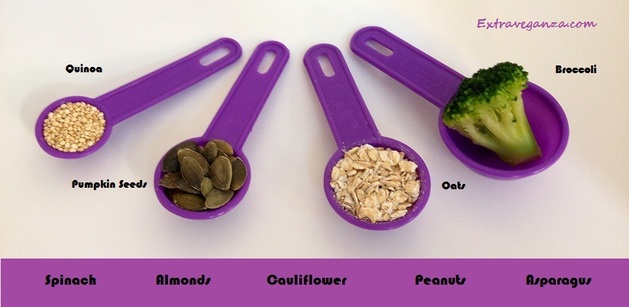
So, we don’t want to make you jealous, but we managed to get ourselves tickets to Wimbledon last week. It didn’t rain, we got to pretend we were tennis regulars, we drank some Pimms (100% vegan by the way, even the new fancy Blackberry & Elderflower version which we haven’t tried - but, if you're reading this Pimms HQ, feel free to send us some, you know, for a review…) and had some vegan food which we had to smuggle in. (N.B.: Definitely no vegan options in and around the court - the strawberries and cream were pre-made so we couldn’t indulge in that tradition). But we got our very own seats on court No. 1 and it got us thinking...

Why aren’t there more vegan athletes in the UK?
Are we really still thinking of vegans as weak, pasty and deficient in some way?
Or is it because the largely carnivorous British public put such pressure on our athletes that for them to adopt a vegan diet would create a backlash from fans?
In the U.S. veganism has been embraced as a clean, healthy and powerful alternative for such high profile stars as the Williams sisters, Carl Lewis and Mike Tyson and also a number of well-known NHL and NFL players. In the national sport, American Football, many players have converted to veganism entirely, and others have, at least during the playing season, embraced veganism for extra energy and speed. US athletes and coaches alike have been quicker off the mark in adopting veganism to complement training and performance than their UK counterparts.
Over here, we’ve got Olympic silver medallist Lizzie Armitstead flying the flag for vegetarians, former WBA heavyweight champion David Haye going vegan and Forest Green Rovers Football Club going vegetarian for players and punters alike, but this is hardly challenging the mainstream.
Top athletes spend hours in training under the guidance of coaches, nutritionists and dietitians and their livelihoods rely on their bodies being in the most healthy, powerful and effective state possible. Why is it then that only a handful have embraced a vegan diet?
A plant-based diet has many proven benefits including lower blood pressure, less body fat and increased energy levels; there is plenty of evidence to show that although more food may have to be consumed more regularly to reach the desired number of calories, a vegan diet is not only a viable option but also a desirable option for athletes.
Okay, animal sources of protein are more bioavailable (the body can make use of them more readily), but with a little mixing and matching of vegan sources of protein, athletes can get just as much as they need - and isn’t that what the nutritionists and chefs are there for anyway?
MORE PROTEIN THAN YOUR PRIME CUT...
The following foods have more protein per 100 calories than the standard steak:
And, what's more, they don't have all the saturated fat and cholesterol. Now of course, 100 calories' worth of broccoli is much more of a mouthful (or mouthfuls in fact) than 100 calories' worth of steak, but it is also much more nutritious calorie for calorie. And for athletes, efficient eating is what it's all about.
So is it then that sports stars are unwilling to consider the vegan option because of the public stigma of veganism?
Meat-eating is still closely linked with popular ideas of masculinity. In their 2011 study, Ruby & Heine recorded how male vegetarians were scored as less ‘manly’ and ‘weaker’ than omnivores, even by non-meat eaters and women who might have been expected to be more level-headed on the subject of diet. Since it is the World Cup, let’s look at the popular image of football players: masculine, with tattoos, a love of expensive cars and popstar/model girlfriends. Would a high-profile footballer identifying as vegan affect his fanbase?
And since football is tied up with national identity, here and in lots of countries, a high profile athlete identifying as vegan might be problematic, too, in terms of marketability - sports stars (particularly in Olympic sports that still; have the veneer of being "amateur") often need to rely on sponsorship and endorsement deals, in lieu of any substantial prize money. Is it too far-fetched to think that these stars aren’t even exploring a vegan dietary option, or being presented with a dietary alternative by their management team, for fear of reducing their earning potential and altering their status in the public's affections.
We are so lucky to live in a country where fresh fruit, vegetables and unadulterated food are readily available and relatively cheap (just try and buy something in the States in a mainstream supermarket that isn’t laced with high fructose corn syrup, we dare you…), and yet over the pond a larger proportion of the public choose a plant-based diet, notwithstanding its expense. We can only hope that our national sports stars, being held up as role models and national icons, will lead the way and introduce more people to a life free from animal products...maybe then we might win more too?
Are we really still thinking of vegans as weak, pasty and deficient in some way?
Or is it because the largely carnivorous British public put such pressure on our athletes that for them to adopt a vegan diet would create a backlash from fans?
In the U.S. veganism has been embraced as a clean, healthy and powerful alternative for such high profile stars as the Williams sisters, Carl Lewis and Mike Tyson and also a number of well-known NHL and NFL players. In the national sport, American Football, many players have converted to veganism entirely, and others have, at least during the playing season, embraced veganism for extra energy and speed. US athletes and coaches alike have been quicker off the mark in adopting veganism to complement training and performance than their UK counterparts.
Over here, we’ve got Olympic silver medallist Lizzie Armitstead flying the flag for vegetarians, former WBA heavyweight champion David Haye going vegan and Forest Green Rovers Football Club going vegetarian for players and punters alike, but this is hardly challenging the mainstream.
Top athletes spend hours in training under the guidance of coaches, nutritionists and dietitians and their livelihoods rely on their bodies being in the most healthy, powerful and effective state possible. Why is it then that only a handful have embraced a vegan diet?
A plant-based diet has many proven benefits including lower blood pressure, less body fat and increased energy levels; there is plenty of evidence to show that although more food may have to be consumed more regularly to reach the desired number of calories, a vegan diet is not only a viable option but also a desirable option for athletes.
Okay, animal sources of protein are more bioavailable (the body can make use of them more readily), but with a little mixing and matching of vegan sources of protein, athletes can get just as much as they need - and isn’t that what the nutritionists and chefs are there for anyway?
MORE PROTEIN THAN YOUR PRIME CUT...
The following foods have more protein per 100 calories than the standard steak:
And, what's more, they don't have all the saturated fat and cholesterol. Now of course, 100 calories' worth of broccoli is much more of a mouthful (or mouthfuls in fact) than 100 calories' worth of steak, but it is also much more nutritious calorie for calorie. And for athletes, efficient eating is what it's all about.
So is it then that sports stars are unwilling to consider the vegan option because of the public stigma of veganism?
Meat-eating is still closely linked with popular ideas of masculinity. In their 2011 study, Ruby & Heine recorded how male vegetarians were scored as less ‘manly’ and ‘weaker’ than omnivores, even by non-meat eaters and women who might have been expected to be more level-headed on the subject of diet. Since it is the World Cup, let’s look at the popular image of football players: masculine, with tattoos, a love of expensive cars and popstar/model girlfriends. Would a high-profile footballer identifying as vegan affect his fanbase?
And since football is tied up with national identity, here and in lots of countries, a high profile athlete identifying as vegan might be problematic, too, in terms of marketability - sports stars (particularly in Olympic sports that still; have the veneer of being "amateur") often need to rely on sponsorship and endorsement deals, in lieu of any substantial prize money. Is it too far-fetched to think that these stars aren’t even exploring a vegan dietary option, or being presented with a dietary alternative by their management team, for fear of reducing their earning potential and altering their status in the public's affections.
We are so lucky to live in a country where fresh fruit, vegetables and unadulterated food are readily available and relatively cheap (just try and buy something in the States in a mainstream supermarket that isn’t laced with high fructose corn syrup, we dare you…), and yet over the pond a larger proportion of the public choose a plant-based diet, notwithstanding its expense. We can only hope that our national sports stars, being held up as role models and national icons, will lead the way and introduce more people to a life free from animal products...maybe then we might win more too?
 RSS Feed
RSS Feed
